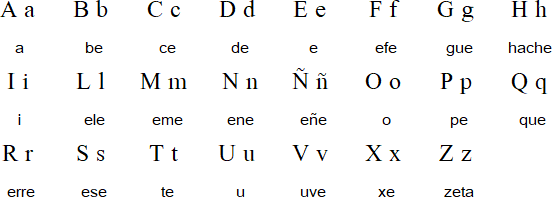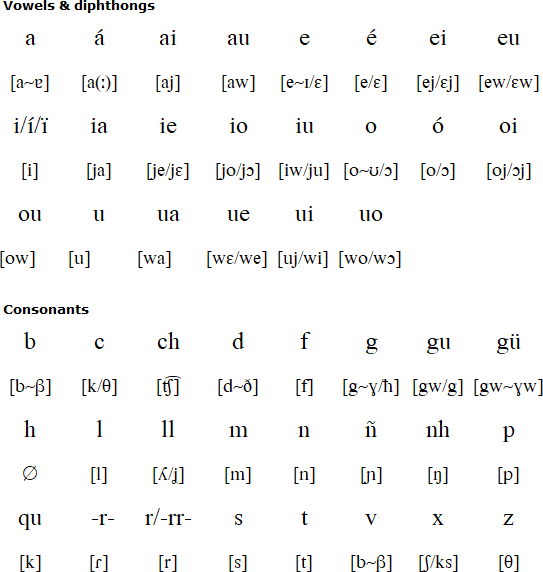Galician is a Romance language spoken by about 2.4 million people (in 2012) mainly in Galicia, in the north-west corner of Spain. It is also spoken in neighbouring areas of Asturias and Castile and León. Galician is more or less mutually intelligible with Portuguese but uses Spanish spelling conventions.
The question of whether Galician and Portuguese are separate languages, or are dialects of the same language, has been debated for decades. This question has political and cultural overtones, reflecting the competing views of some who see Galician as more influenced by Portuguese, and others who see a greater influence from Spanish.
During 12th century sentences in Galician started appearing in Latin texts. The language used is known as Galician-Portuguese, Old Portuguese or Old Galician. The earliest writing in this language is a poem that dates from 1200. Many songs were written in Galician-Portuguese between the 13th and 15th centuries, as well as poems, religious texts and other material.
Galician emerged as a standardised literary language during the 19th century when there was a revival (rexurdimento) in the language and culture of Galicia. One person who was particularly active in the revival movement was Frei Martín Sarmiento. The publication in 1863 of Rosalía de Castro's poem Cantares Gallegos, which was written entirely in Galician, marked the beginning of the revival in the fortunes of Galician.
During early 20th century, an organisation known as the Irmandades da Fala (Brotherhoods of the Language) was set up to defend, promote and dignify the Galician language and a number of Galician language journals began to appear. An attempt in the 1930s to give autonomy to Galicia and official status to Galician was never promulgated due to the Civil War (1936-1939). During Franco's dictatorship (1939-1975) edicts were issued to forbid speaking and teaching Galician, and publishing books and newspapers in Galician. In the 1950s some publications in Galician were permitted.
Galician gained official status in 1978 and is recognised as one of Spain's five official languages (lenguas españolas), along with Spanish (Castilian), Catalan, Basque and Aranese. Primary and secondary schools in Galicia teach bilingually in Galician and Spanish, and Galician is the main medium of instruction in universities in Galicia.
Some one thousand or so books are published in Galician each year and there is a Galician TV channel (established in 1985), a Galician radio station (set up in 1996), and a daily Galician language newspaper, O Correo Galego.
In cities in Galicia more Spanish than Galician tends to be spoken, however Galician is widely-spoken in rural areas.
The current Galician alphabet was introduced by the Royal Galician Academy in 1982. It became the official orthography in 1983.

The letters J (iota), K (ca), W (uve dobre) and Y (i grego) are also used but only in loan words. There are also six digraphs: CH, GU, LL, NH, QU and RR. QU and GU are used only before the vowels E and I.

Download an alphabet chart for Galician (Excel)
Some information about Galician provided by Michael Peter Füstumum
Tódolos seres humanos nacen libres e iguais en dignidade e dereitos e, dotados como están de razón e conciencia, díbense comportar fraternalmente uns cos outros.
A recording of this text by Omar Carrillo
All human beings are born free and equal in dignity and rights. They
are endowed with reason and conscience and should act towards one another
in a spirit of brotherhood.
(Article 1 of the Universal Declaration of Human Rights)
See more videos like this on Wikitongues
Information about Galician | Phrases | Numbers | Family words | Tower of Babel
Information about the Galician Language
http://galego.org/
http://en.wikipedia.org/wiki/Galician_language
https://fr.wikipedia.org/wiki/Galicien
http://usuarios.lycos.es/Celtic_Galiza/galegoh.html
Online Galician lessons
http://gl.wikibooks.org/wiki/Curso_de_lingua_galega
http://polymath.org/galician.php
http://www.youtube.com/user/SpeakingGalician
Online Galician dictionaries
http://webs.uvigo.es/sli/lexico/
http://www.diccionarios.com
Compañía de Radio- Televisión de Galicia (includes live streams)
http://www.crtvg.es
Aragonese, Aranese, Aromanian, Asturian, Catalan, Corsican, Dalmatian, Emilian-Romagnol, Extremaduran, Fala, Franco-Provençal, French, Friulian, Galician, Gallo, Gascon, Genoese, Guernésiais, Istro-Romanian, Istriot, Italian, Jèrriais, Ladino, Ladin, Ligurian, Lombard, Lorrain, Megleno-Romanian, Mirandese, Moldovan, Monégasque, Mozarabic, Neapolitan, Occitan, Occitan (Auvergnat), Occitan (Languedocien), Occitan (Limousin), Occitan (Provençal), Picard, Piedmontese, Portuguese, Romanian, Romansh, Sardinian, Sicilian, Spanish, Valencian, Venetian, Walloon
Languages written with the Latin alphabet
Page last modified: 11.02.22
[top]
You can support this site by Buying Me A Coffee, and if you like what you see on this page, you can use the buttons below to share it with people you know.

If you like this site and find it useful, you can support it by making a donation via PayPal or Patreon, or by contributing in other ways. Omniglot is how I make my living.
Note: all links on this site to Amazon.com, Amazon.co.uk
and Amazon.fr
are affiliate links. This means I earn a commission if you click on any of them and buy something. So by clicking on these links you can help to support this site.
[top]